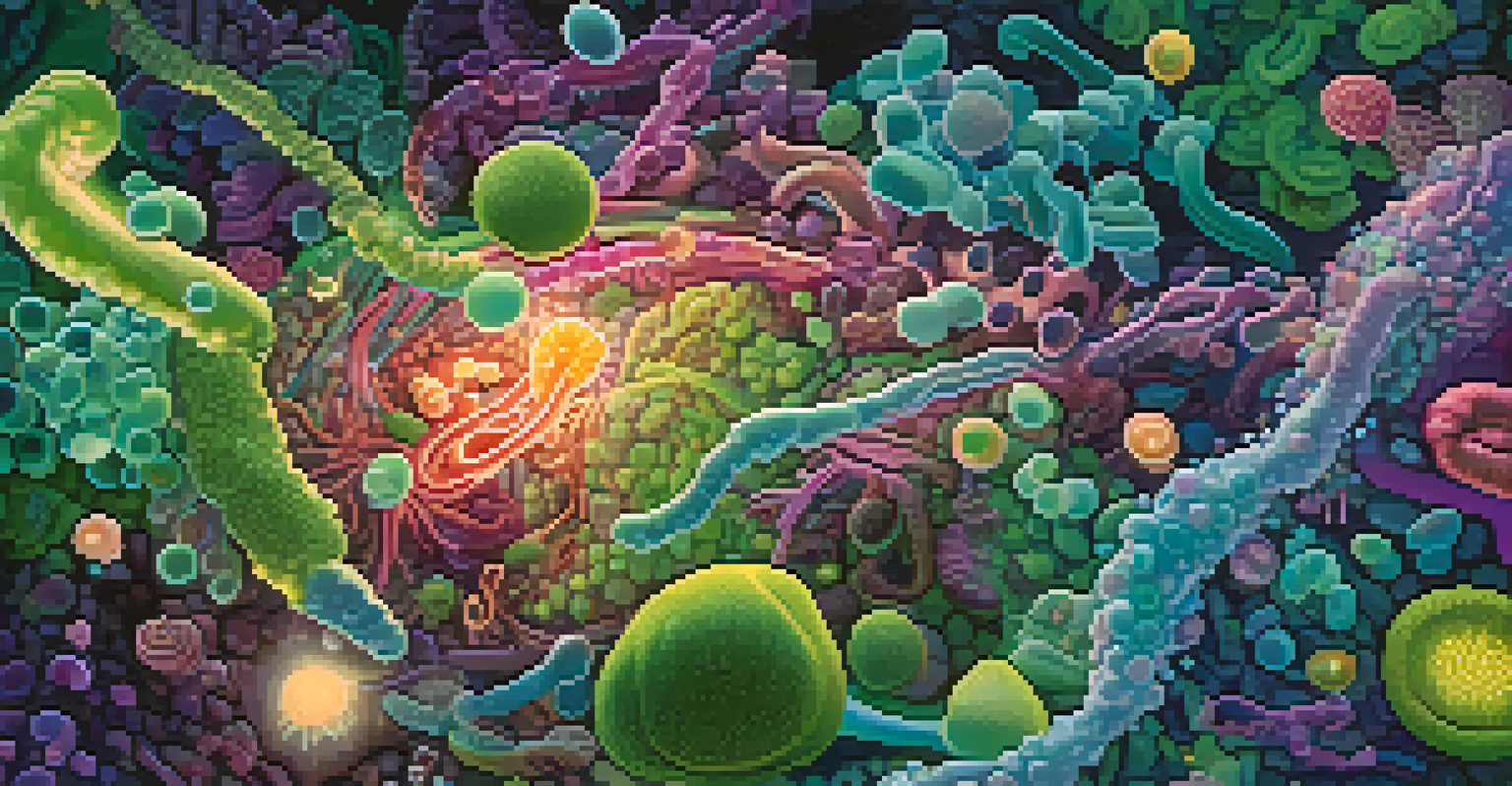How Gut Microbiome Affects Nutrient Absorption and Metabolism

What is the Gut Microbiome and Why It Matters
The gut microbiome refers to the vast community of microorganisms living in our intestines. These tiny organisms, including bacteria, viruses, and fungi, play a crucial role in our overall health. They help digest food, produce vitamins, and protect against harmful pathogens.
The gut microbiome is a critical component of human health, influencing everything from digestion to immune response.
Understanding the gut microbiome is essential because it influences many bodily functions, including our immune system and mental health. When the balance of these microorganisms is disrupted, it can lead to issues like digestive disorders, obesity, and even anxiety.
By nurturing a healthy gut microbiome, we not only improve digestion but also support our body’s ability to absorb nutrients efficiently. This intricate relationship highlights why it’s important to pay attention to what we eat.
How Gut Microbiome Affects Nutrient Absorption
The gut microbiome can significantly impact how our body absorbs essential nutrients. Certain bacteria in the microbiome are known to break down complex carbohydrates, making them easier for our body to absorb. This process ensures that we receive the maximum benefit from the foods we consume.

For example, fiber-rich foods like fruits and vegetables are fermented by specific gut bacteria, producing short-chain fatty acids that not only nourish the cells of the gut lining but also enhance nutrient absorption. Without a robust microbiome, our bodies might struggle to extract vital nutrients from these healthy foods.
Gut Microbiome Affects Health
The gut microbiome plays a crucial role in digestion, immune function, and mental health.
Moreover, a diverse gut microbiome is linked to improved absorption of vitamins and minerals, such as B vitamins and magnesium. This diversity allows for a more efficient breakdown of food components, ultimately leading to better health outcomes.
The Role of Probiotics and Prebiotics
Probiotics are live beneficial bacteria that can enhance the gut microbiome and improve nutrient absorption. Foods like yogurt, kefir, and fermented vegetables are rich in probiotics, and incorporating them into your diet can help restore balance in the gut.
You are what you eat, but more importantly, you are what your gut bacteria eat.
On the other hand, prebiotics are non-digestible fibers that feed these beneficial bacteria. Foods such as garlic, onions, and bananas contain prebiotics that stimulate the growth of good bacteria, further enhancing our gut health.
By consuming both probiotics and prebiotics, we support a healthy microbiome, which, in turn, optimizes our ability to absorb nutrients. This synergy is a simple yet effective way to bolster our overall health.
Impact of Diet on Gut Microbiome Composition
The foods we choose to eat can drastically affect the composition of our gut microbiome. Diets high in processed foods and sugars can lead to an imbalance of harmful bacteria, which may hinder nutrient absorption. In contrast, a diet rich in whole foods promotes a diverse and healthy microbiome.
For instance, Mediterranean diets, which emphasize fruits, vegetables, whole grains, and healthy fats, have been shown to support a flourishing gut microbiome. This diet not only benefits gut health but also enhances our body's ability to absorb nutrients efficiently.
Diet Influences Microbiome Balance
Eating a diverse range of whole foods promotes a healthy gut microbiome and enhances nutrient absorption.
Making conscious dietary choices can thus influence not just our gut health but our overall metabolic processes. It’s a reminder that what we eat matters.
How Stress and Sleep Affect Gut Health
Stress and lack of sleep can negatively impact the gut microbiome, leading to reduced nutrient absorption. When we are stressed, our bodies enter a fight-or-flight mode, which can alter digestive functions and the microbiome's balance.
Sleep is equally important; studies have shown that inadequate sleep can lead to an imbalance of gut bacteria. This imbalance may compromise our ability to absorb nutrients, thereby affecting our overall health.
Prioritizing stress management through practices like mindfulness and ensuring adequate sleep can help maintain a healthy gut microbiome, ultimately supporting nutrient absorption and metabolism.
The Connection Between Gut Health and Metabolism
Gut health plays a crucial role in how our body metabolizes food and regulates energy. A balanced microbiome can influence metabolic processes, including how fats and carbohydrates are broken down and utilized by the body.
Research has shown that certain gut bacteria are associated with leaner body types and better metabolic health. These bacteria can enhance fat storage and energy expenditure, which are critical for maintaining a healthy weight.
Stress and Sleep Impact Gut Health
Managing stress and ensuring adequate sleep are vital for maintaining a balanced gut microbiome and optimizing nutrient absorption.
Conversely, an imbalanced microbiome may contribute to metabolic disorders such as obesity and diabetes. This connection underscores the importance of maintaining gut health for overall metabolic function.
Practical Tips for Supporting Gut Health
Supporting your gut health is easier than you might think. Start by incorporating a variety of fiber-rich foods into your diet, such as legumes, whole grains, and a colorful array of fruits and vegetables. This diversity can promote a healthy microbiome.
Additionally, consider adding fermented foods to your meals or taking probiotic supplements to boost beneficial bacteria. Regular physical activity also plays a role in promoting a healthy gut.

Finally, don’t underestimate the power of hydration and good sleep. Together, these simple lifestyle changes can greatly support your gut microbiome, enhancing nutrient absorption and overall well-being.